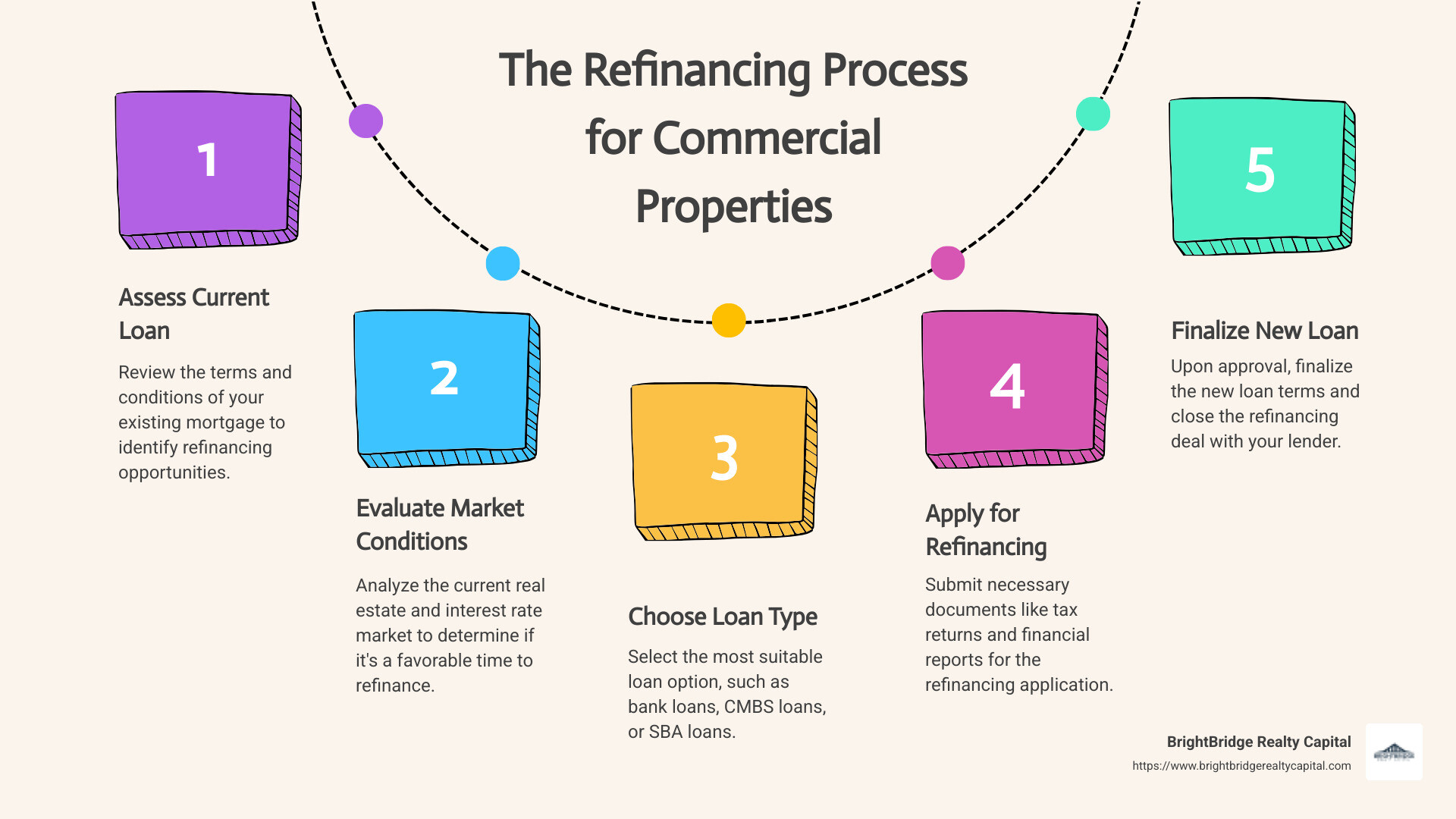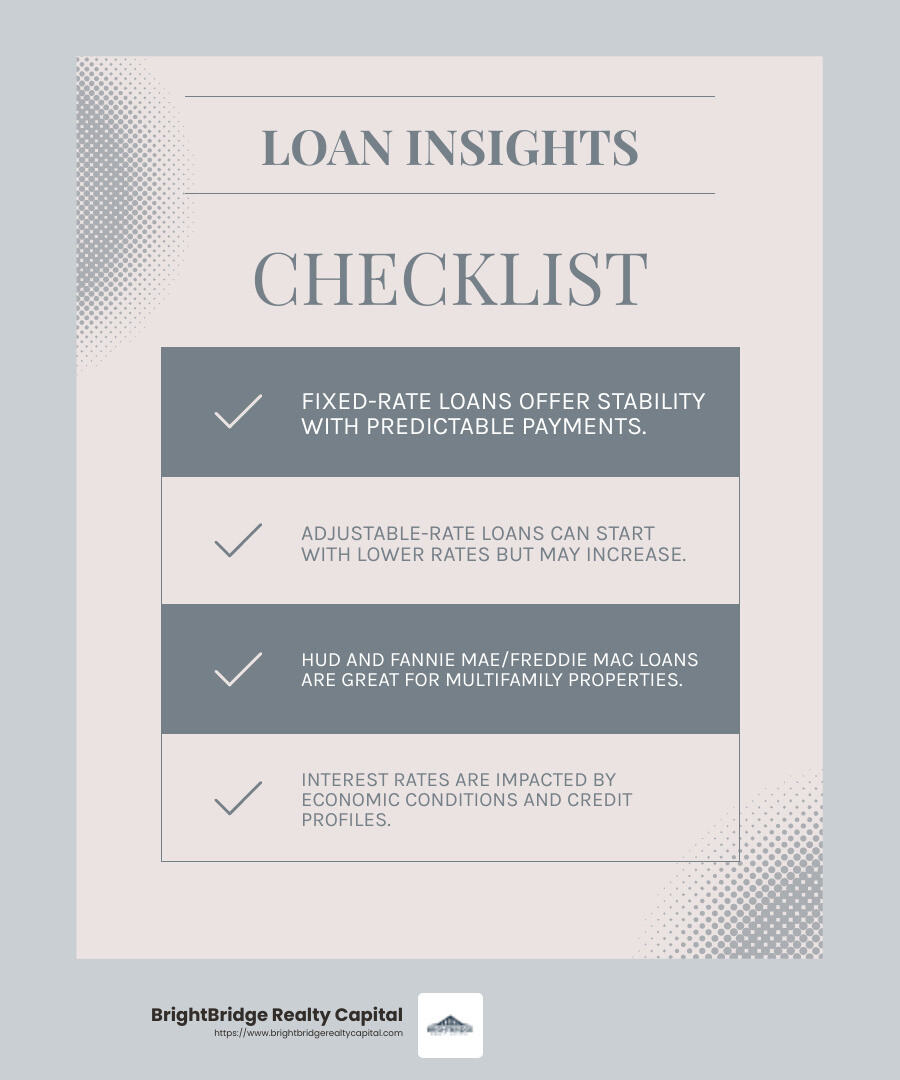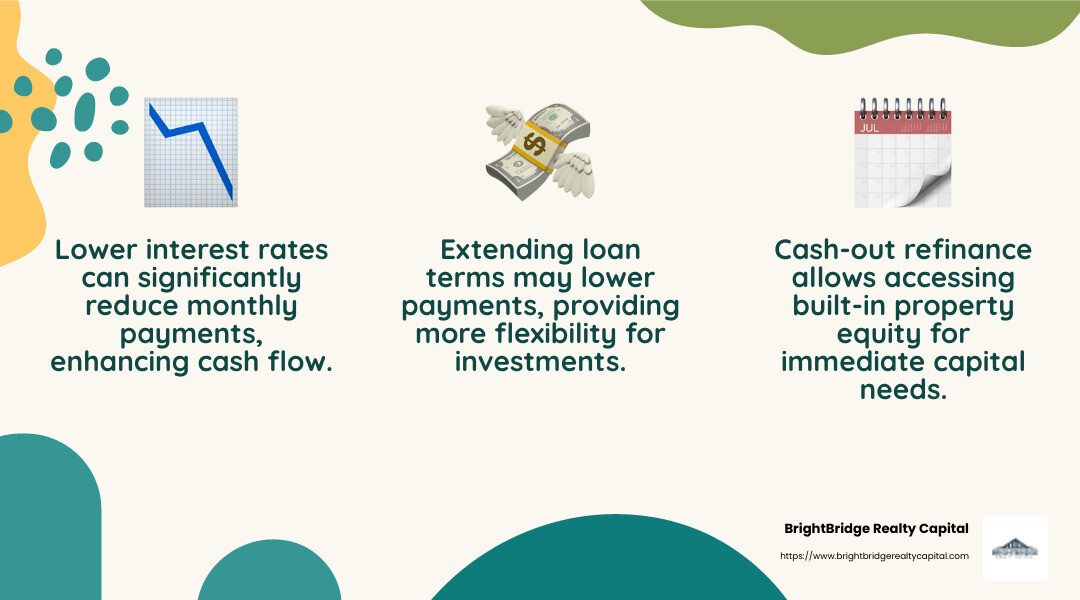Refinancing Your Commercial Property: What You Need to Know

Commercial property refinancing is a powerful financial tool for real estate investors. It allows you to replace an existing mortgage on a commercial property with a new loan, often on more favorable terms. Immediate benefits include:
- Lower interest rates: Reduce monthly payments and save money in the long term.
- Improved cash flow: Free up capital for new investments or property improvements.
- Access to equity: Use the increased property value for cash-out refinances.
Real estate markets are ever-changing, and refinancing allows investors to capitalize on favorable conditions. It’s a smart strategy to improve portfolio growth and financial stability.
Imagine you’re an investor in busy New York, eager to maximize your rental property revenue. With the right refinancing strategy, you can reduce costs, access equity, and seize opportunities more efficiently.
Refinancing isn't just about lowering interest rates. It's about changing your financial landscape to better align with your investment goals. Seize the potential, open up equity, and let your dollars work harder for you by understanding the ins and outs of refinancing.

Basic Commercial property refinancing vocab:
Understanding Commercial Property Refinancing
Refinancing a commercial property can open doors to better financial terms and strategic growth. Let’s break down the basics.
Refinancing Options
When it comes to commercial property refinancing, there are several paths you can take. Each has its unique features and benefits:
Bank Loans: These are traditional loans that banks offer. They usually come with fixed or adjustable interest rates and terms ranging up to 25 years. They often require full recourse, meaning the borrower is personally liable for the debt.
CMBS Loans: Commercial Mortgage-Backed Securities (CMBS) loans are packaged and sold as securities. They offer non-recourse options and longer amortization periods, often up to 30 years.
SBA Loans: The Small Business Administration (SBA) offers loans for owner-occupied properties. They feature long terms and low down payments but require full recourse.
HUD Loans: For multifamily properties, HUD offers loans with long terms and high loan-to-value (LTV) ratios, often reaching 90%. These are fully amortizing and non-recourse.
Fannie Mae/Freddie Mac: These government-sponsored enterprises provide loans for multifamily properties with competitive rates and terms up to 30 years. They are typically non-recourse.
Loan Types and Interest Rates
Understanding the type of loan and its interest rate is crucial:
Fixed-Rate Loans: These loans have a stable interest rate throughout the loan term, offering predictability in monthly payments.
Adjustable-Rate Loans: The interest rate on these loans can change based on market conditions. They might start lower than fixed rates but could increase over time.
Interest rates are influenced by various factors, including the broader economic environment and the borrower's credit profile. In recent years, interest rates have been relatively low, making refinancing an attractive option for many.
Making the Right Choice
Choosing the right refinancing option depends on your specific needs:
- If you prioritize stability, a fixed-rate loan might be your best bet.
- If you’re looking to minimize initial costs, consider an adjustable-rate loan with a lower starting rate.
- For multifamily properties, HUD or Fannie Mae/Freddie Mac loans offer attractive terms.

Refinancing is not just about swapping loans. It's about finding the right fit for your financial goals and property type. By understanding your options, you can make strategic decisions that improve your investment portfolio and financial health.
Key Benefits of Commercial Property Refinancing
Refinancing your commercial property can open up a host of benefits that can significantly impact your financial health and investment strategy. Let's explore the key advantages.
Better Interest Rates
One of the most compelling reasons to consider commercial property refinancing is the potential to secure a lower interest rate. Lower rates mean reduced monthly payments, which can free up cash for other investments or operational needs.
Current Market Conditions: Interest rates fluctuate based on economic conditions. If rates have dropped since you first secured your loan, refinancing could lead to substantial savings.
Fixed vs. Adjustable Rates: Depending on your risk tolerance, you might opt for a fixed-rate loan for stability or an adjustable-rate loan if you anticipate further rate drops.
Improved Cash Flow
Refinancing can also boost your cash flow, allowing you to redirect funds into other areas of your business or investment portfolio.
Lower Monthly Payments: By refinancing at a lower interest rate, you reduce your monthly outlays, leaving you with more disposable income.
Extend Loan Terms: Extending the term of your loan can also lower monthly payments, though it may increase the total interest paid over time.
Cash-Out Refinance
A cash-out refinance is a strategic way to leverage the equity in your property for immediate capital needs without selling the asset.
Access to Capital: By refinancing, you can pull out a portion of your property's equity in cash. This can be used for renovations, new property acquisitions, or other business opportunities.
Tax Benefits: Unlike selling a property, extracting equity through refinancing generally doesn’t trigger a tax event, allowing you to reinvest with fewer tax implications.

In summary, commercial property refinancing can be a powerful tool to optimize your financial situation. Whether it's securing better interest rates, enhancing cash flow, or leveraging a cash-out refinance, the benefits can be significant. As always, it's crucial to assess your specific financial situation and goals to determine the best refinancing strategy for you.
Risks and Challenges in Commercial Property Refinancing
While commercial property refinancing offers many benefits, it's not without risks and challenges. Understanding these factors can help you make informed decisions.
Refinance Risk
Refinance risk refers to the potential difficulty in securing a new loan under favorable terms when your current loan matures. This risk is influenced by several factors:
Borrower's Financial Condition: If your financial health declines, lenders may view you as a higher risk, affecting your ability to refinance.
Market Liquidity: In tight credit markets, lenders may be less willing to offer favorable terms, increasing the challenge of refinancing.
To manage refinance risk, maintain a strong financial profile and stay informed about market trends.
Market Conditions
Market conditions play a significant role in determining the success of your refinancing efforts. Key market factors include:
Interest Rate Fluctuations: If interest rates rise, refinancing might lead to higher monthly payments, negating potential savings.
Economic Environment: Economic downturns can tighten lending standards, making it harder to secure a new loan.
Keeping an eye on interest rate trends and economic indicators can help you time your refinancing for optimal results.
Borrower-Specific Factors
Each borrower brings unique factors to the table that can influence refinancing outcomes:
Creditworthiness: A strong credit score and financial history increase your chances of securing favorable loan terms.
Property Value: Changes in your property's value can impact your loan-to-value ratio, affecting your refinancing options. A decrease in property value might limit the amount you can borrow.
Existing Loan Terms: Prepayment penalties or unfavorable terms in your current loan can affect the cost-effectiveness of refinancing.
By understanding and addressing these borrower-specific factors, you can improve your refinancing prospects.
Navigating the complexities of commercial property refinancing requires a clear understanding of these risks and challenges. By staying informed and proactive, you can better position yourself to capitalize on refinancing opportunities.
Types of Commercial Property Refinancing Options
When it comes to commercial property refinancing, there are several options available. Each has its own benefits and requirements, so choose the one that fits your needs best.
Bank Loans
Bank loans are a popular choice for refinancing commercial properties. They often come with competitive interest rates, especially if you have a strong financial profile. However, banks typically have strict requirements. You might need a high credit score, a solid operating history, and a favorable debt service coverage ratio (DSCR).
Pros:
- Competitive interest rates
- Potentially longer terms
Cons:
- Strict eligibility criteria
- May require significant documentation
CMBS Loans
CMBS loans (Commercial Mortgage-Backed Securities) are another option. These loans are packaged into securities and sold to investors. CMBS loans often offer longer terms and amortizations than traditional bank loans.
Pros:
- Longer terms and amortizations
- Focus on property's financials rather than borrower's credit
Cons:
- Complex servicing agreements
- Potential for balloon payments
SBA Loans
For owner-occupied properties, SBA loans (Small Business Administration) are an excellent option. The SBA backs these loans, allowing for favorable terms and capped interest rates. The SBA 7(a) and 504 loans are popular choices.
Pros:
- Capped interest rates
- Government backing
Cons:
- Lengthy approval process
- Full recourse loans
HUD Loans
HUD loans are ideal for refinancing multifamily properties. The HUD 223(f) program offers long, fully amortizing terms with high loan-to-value ratios. This makes them attractive for properties with commercial space up to 20%.
Pros:
- Long terms (up to 35 years)
- High LTV ratios (up to 90%)
Cons:
- Not suitable for fully commercial properties
- Lengthy approval process
Fannie Mae and Freddie Mac
Fannie Mae and Freddie Mac offer a variety of refinancing options for multifamily properties. These loans provide flexibility with terms ranging from 5 to 30 years, and they allow a portion of the property to be leased to commercial tenants.
Pros:
- Flexible terms and payment options
- High LTV ratios (up to 80%)
Cons:
- Not for fully commercial properties
- May have stricter eligibility criteria
Choosing the right commercial property refinancing option depends on your specific situation, including your property's type, your financial health, and your investment goals. Each option has unique features, so it's important to understand what each offers before making a decision.
Frequently Asked Questions about Commercial Property Refinancing
What are the benefits of refinancing a commercial real estate loan?
Refinancing a commercial real estate loan can offer several benefits:
Lower Interest Rates: Refinancing can help you secure a lower interest rate, which means you pay less over the life of the loan. This can be especially beneficial if rates have dropped since you first took out your loan.
Improved Cash Flow: By reducing your monthly payments, refinancing can improve your cash flow. This frees up capital for other investments or operational needs.
Managing Balloon Payments: If your current loan has a balloon payment coming up, refinancing can help you spread that payment over a longer term, avoiding a large one-time expense.
What are the risks associated with refinancing a commercial real estate loan?
While refinancing can be beneficial, there are also risks involved:
Higher Payments: If you refinance at a higher interest rate or choose a shorter loan term, your monthly payments could increase.
Property Value Concerns: If the value of your property has decreased, you might find yourself underwater on your loan, meaning you owe more than the property is worth.
Changing Loan Terms: Be aware that refinancing might change the terms of your loan, which could impact your financial strategy.
What documents are required to refinance a commercial real estate loan?
When refinancing, you'll need to provide several documents to your lender:
Tax Returns: Lenders will require business tax returns to assess your financial health and stability.
Financial Reports: These include profit and loss statements, balance sheets, and cash flow statements to give a comprehensive view of your business's finances.
Appraisal: A third-party appraisal of the property is necessary to determine its current market value.
These documents help lenders evaluate your eligibility and the terms they can offer for your refinancing. Make sure to have them prepared to streamline the process.
In the next section, we'll explore how to choose the best refinancing option for your commercial property needs.
Conclusion
At BrightBridge Realty Capital, we understand the importance of quick and efficient funding when it comes to commercial property refinancing. Our mission is to provide customized real estate financing solutions that align with your unique investment goals.
One of the standout features of our service is the ability to offer fast closings, often within a week. This speed is crucial in the real estate market, where timing can make a significant difference in securing the best deals. By eliminating intermediaries, we streamline the process, ensuring you get the funding you need without unnecessary delays.
Moreover, our competitive rates are designed to give you the best possible return on your investment. We know that every percentage point counts, and our direct lending approach allows us to offer rates that are hard to beat.
Whether you're looking to lower your monthly payments, manage a balloon payment, or access cash for new opportunities, we're here to help. Our team is dedicated to making the refinancing process as smooth and straightforward as possible.
Ready to take the next step in your real estate journey? Explore our services and see how BrightBridge Realty Capital can support your investment strategy with quick, flexible funding and competitive rates.


